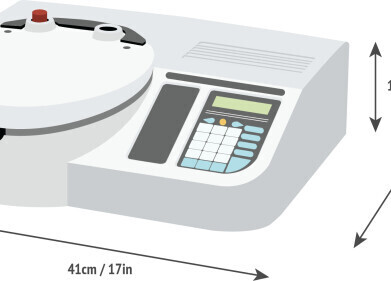Chromatography
Are All Body Clocks the Same?
Dec 21 2017
From late nights to long flights, it's all too easy to disrupt the body clock. While switching time zones can seem like a drag, new research suggests that humans aren't the only ones affected by circadian rhythms.
According to a study reported at the Society for Neuroscience’s annual meeting, three species of orb-weaving spiders may have the shortest natural circadian rhythms in the animal kingdom. Every day Allocyclosa bifurca, Cyclosa turbinata and Gasteracantha cancriformis experience the equivalent of five hours of jet lag, bought on by the act of spinning webs before dawn to arm themselves against predators.
Shunning the 24-hour day/night cycle
While most animals have natural body clocks that stick to the 24-hour day/night cycle experiences by humans, orb weavers operate on anything from 17 to 19-hour cycles. This means they shift their states of activity and rest by around five hours a day to keep up with the normal cycle.
According to Darrell Moore, a neurobiologist at East Tennessee State University in Johnson City, “That’s like flying across more than five time zones, and experiencing that much jet lag each day to stay synchronised with the typical day-night cycle."
As circadian clocks exist to keep the body from plunging into chaos, he adds that “Theoretically, [the spiders] should not exist.”
Thriving in a constant state of "jet lag"
For most animals, internal body clocks play an important role in helping them carry out daily activities like eating, sleeping and hunting. In fact, previous studies suggest that animals that don't conform to the 24-hour solar cycle are more likely to produce weak offspring.
Interestingly, orb-weaving spiders are an exception to the rule. Despite having significantly shorter circadian clocks all three species seemed to function without any negative impact. In fact, it appears to be beneficial to their predatory lifestyle.
For scientists, determining why the spiders can function so far off the "normal" circadian clock cycle could offer ground-breaking insight into how body clocks help certain species overcome environmental challenges.
“The method or molecular mechanism will be really fascinating to figure out,” comments Sigrid Veasey, a neuroscientist at the University of Pennsylvania.
Body clocks are so vital to human function that Circadian Rhythm Disorders have been identified as genuine medical conditions. From melatonin to benzodiazepines, there are a handful of drugs used to treat ongoing disorders. For a closer look at the latest pharmaceutical developments 'Analytical Method Development and Validation for the Identification of Spiraeoside Using RP-HPLC in Pharmaceutical Gel Formulation' spotlights the role of Meadowsweet Filipendula ulmaria, a flowering herb coveted for its analgesic, corroborant, anti-inflammatory, wound-healing, antiulcerogenic, hypoglycaemic, sedative, antihemorrhoid, astringent and diuretic properties.
Digital Edition
Lab Asia Dec 2025
December 2025
Chromatography Articles- Cutting-edge sample preparation tools help laboratories to stay ahead of the curveMass Spectrometry & Spectroscopy Articles- Unlocking the complexity of metabolomics: Pushi...
View all digital editions
Events
Jan 21 2026 Tokyo, Japan
Jan 28 2026 Tokyo, Japan
Jan 29 2026 New Delhi, India
Feb 07 2026 Boston, MA, USA
Asia Pharma Expo/Asia Lab Expo
Feb 12 2026 Dhaka, Bangladesh



















